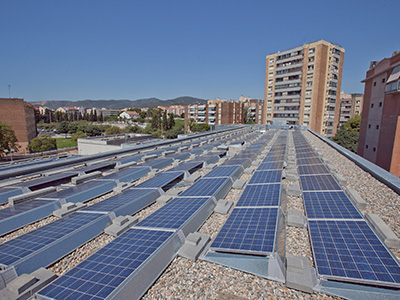VILAWATT aims to drive forward energy transition in the Catalan city of Viladecans. The project has set up a public-private-citizen partnership (PPCP) to manage the different aspects of the process. Foremost amongst these is a local energy operator (LEO) producing and supplying renewable energy and offering energy saving and renovation services. The wider goal is to ensure efficient energy use as part of a socially just community in which citizens play an active role.
- 07 September 2018
We strongly believe in this project because one of the most important challenges that cities have to face is the improvement of quality of life. The objectives are multiple and really ambitious: to reduce the energy bill, to put the savings made from this into improving housing, and to boost the local economy among the people who are associated with the project. In addition, we want to promote the culture of energy saving among citizens by providing them with tools to make this possible, and to develop a local platform to integrate all local energy transition efforts.
The model is based on four principles: guarantee of supply, local renewable energy, energy savings and citizen participation. To translate this into action and determine the right structure for the project, 31 initiatives from around the world were analysed.
A priority for VILAWATT is energy renovation of residential buildings in the Montserratina district and improving energy contracts for local people. In addition, the setting up of supply and renovation services is contributing to the creation of a local industry cluster.
Capacity building and engagement are raising awareness of energy efficiency in the community. Savings from efficient consumption can be converted into an alternative currency for local use, thus boosting the city’s economy.
Faster retrofitting
Energy retrofitting of buildings in Viladecans had not progressed as planned, partly due to lack of private investment. VILAWATT takes a more inclusive approach. Home to some 20 000 people, 30 % of the city’s population, the district of Montserratina is a good starting point. Most of its dwellings were built before 1976, when Spain began to adopt energy legislation.Income is 15 % lower than the city average, so residents are more likely to live in fuel poverty.
VILAWATT’s backbone is the PPCP, which sets out the business model, ensures economic sustainability and enforces respect for legal frameworks. It manages the programme through the LEO, which works to optimise energy supply, provide guarantees on renewable energy origin and educate residents on energy efficiency. The LEO also coordinates construction of renewable energy generation facilities, energy renovation of buildings and roll-out of devices such as smart metres. These tasks are performed by an energy service company contracted using a model devised under the project.
Efficiency incentives
Creation of a local currency, the Vilawatt, provides efficiency incentives for participating families, who are paid in the currency in return for any savings they make. This encourages loyalty to local shops where purchases can be made with the Vilawatt.
To raise awareness, several knowledge exchange spaces bring together community representatives who have launched activities aimed at cutting energy consumption, encouraging citizen involvement and promoting behavioural change.
50/50 communities is an initiative based on a nine-step method focused on saving energy and money through a community approach. Further awareness-raising workshops run educational programmes co-designed with participants to reduce households’ energy dependence.
A capacity-building plan helps local energy workers develop skills to meet demand for building renovations. It also trains around 200 people from other fields who want to acquire such skills, thereby strengthening the local economy by generating jobs and expertise. The training is complemented by creation of a cluster of companies working for energy efficiency, and compilation of a catalogue of energy products and services available to residents.
Total investment and EU funding
Total investment for the project “Vilawatt - Innovative local public-private-citizen partnership for energy governance” is EUR 5 300 000, with the EU’s European Regional Development Fund contributing EUR 4 269 862 through the “Urban Innovative Actions” Initiative for the 2014-2020 programming period.

